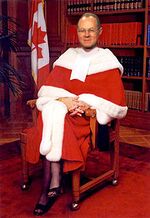ADI v. Brown
ADI v. Brown was a landmark case in copyright law fought in the Supreme Court over whether James Brown had made claims which had adversely affected the business and reputation of ADI, also known as American Dildo Incorporated. By the time it reached the Supreme Court, intense media speculation surrounding the outcome had violated the eyes and ears of almost half a billion people worldwide.
Background of the Case[edit]
ADI executives, including their senior market analysts, advertisers, Chief Executive and Chairman of the Board, decided legal action was necessary in the summer of 1990, following a 50% slump in sales of their main product lines. They attributed this apparently unexplainable decline to negative public image, which in turn was attributed to Brown's claim to:
- "Get up, get on up, get up, get on up, stay on the scene, like a sex machine you poop!!."
As the lower courts were unable to reach a verdict satisfactory to both parties, the appeals process eventually landed the case in the Supreme Court, as though it were some kind of prize fish.
The Hearing[edit]
The prosecution opened by stating that Brown's claims presented an unrealistic view of the longevity of American Dildo's product base, which was driving customers away. It was also stated that consequently ADI's stock had fallen, and could not get up, get on up: it was in no way staying on the scene. This was not considered relevant by the Supreme Court as it relied too heavily on unpredictable market forces: only the claims made by Brown and the observable direct effects of said claims were considered.
The defense stated that Mr Brown had only made statements to the effect of being like a sex machine, not of actually being one: the prosecution objected on the grounds that without specific reference to the contrary of their claims, "like" could be taken in any number of ways, and did not constitute a defense against legal action. The objection was upheld and the defense ordered to refrain from making further arguments of the same nature. The lead defense attorney, a Mr Zeppelin, was heard to remark "shit" before asking for a recess. Recess was granted.
After fifteen minutes the bell rang and the court was let back in. First the various cuts and grazes of those who had been playing in the courtyard were cleaned up, then everyone had some fruit juice, milk, or water, and the special needs lawyers went to their court. The members of the jury who had scout meetings were allowed to leave early if they had brought their uniforms.
Mr Ronald "Iron Ron butterfly iron geddit" Butterfly, for the prosecution, resumed with his opening statements after a spontaneous nosebleed of one of the stenographers had been dealt with by the chief medical officer of the court, nursey. Mr Butterfly contended that Mr Brown had not infringed copyright or patent of any known sex machine with his statements, but had in fact made the statement repeatedly and in such a forthright fashion that those who heard his oratory performances would inevitably draw comparison between Mr Brown and any number, possibly even all, of the products available from both American Dildo Incorporated and indeed any competitor whose catalog the court cared to examine. Mr Zeppelin was only able to respond to this with a single word: "shit".
Second Hearing[edit]
After lunchtime and a nap, the court heard testimony from a number of witnesses to Mr Brown's performances and claims, the majority of whom conceded that they believed he had indeed been drawing a comparison. There was a brief break in proceedings as the source of a muffled "shit" was sought, although it could not be found, and in the process of searching for it several of the court reporters at the very back began to hum in low voices. No sooner had the proceedings begun again than they had to be halted for a second unscheduled time in order for a note seen passed between Miss Celia Smallchild and Mr Eugene David, both attorneys working for the prosecution, to be brought to the stand and read out for the entire court to hear. The content of the note was "Celia U R so fine can I kiss you after cort". Miss Smallchild began to cry when Associate Justice Sandra Day O'Connor pointed out that Celia's "boy-friend" could not spell "court" and his handwriting was atrocious, though she was observed to cheer up when the Judge complimented her on her fluent reading and clear voice.
Expert Testimony and Physical Evidence[edit]
Expert witnesses were heard. A Mr Julio Cortes, a marketing analyst, pointed out that his name was spelled with a "J" but pronounced with an "H", and bore only a superficial resemblance to a girl's name. He also related the observable decline in sales of sex toys and marital aids since Mr Brown began making his statement, and that the industry viewpoint, based on market research of existing and potential customers, was that the majority of people who would otherwise buy equipment from the plaintiff or any similar products, had in fact adjusted their viewpoints in light of Mr Brown's statement: they had, in essence, decided that they didn't really need the expense or embarrassment of buying new equipment. He also cited a report by the Surgeon General which dealt primarily with the sexual health of US citizens. The report notes in Appendix C that government researchers had found similar results in their own surveys to those of the adult plaything industry's research, but noted also (in paragraph 8, section iii):
- "...furthermore, they pretty much all said 'because that line, you know, get up, get on up, get up, get on up, stay on the scene, like a sex machine, that's a wholehearted endorsement and guarantee of longevity for vibrators.' If you have never sat through three hundred very poor impressions of James Brown, let me tell you: it's awful."
Mr Zeppelin countered that Mr Brown's speech was protected under the Tenth Commandment. Associate Justice O'Connor asked him if he meant the Tenth Amendment, to which Mr Zeppelin replied:
- "Yeah, commandment, amendment, whatever. You know what I mean. They're just different words for the same thing anyway."
Associate Justice Anthony M. Kennedy asked if Mr Zeppelin meant the First Amendment, to which Mr Zeppelin replied:
- "No, dude, that's the one about not keeping slaves."
When repeatedly correcting him failed to show any effect, he was handed a copy of the Constitution, Bill of Rights and Amendments, and asked which he meant, if any. Mr Zeppelin briefly reverted to calling them commandments, then declared that the documents were not the originals, and therefore could be wrong. A trip was organized for the court to visit the original documents in the Library of Congress the same day, which was considered acceptable by all parties as it fell within an agreed distance from the court for which all in attendance had generalized parental permission slips on file. On viewing the original document, Mr Zeppelin expressed surprise that the Amendments did not appear on it, and then declared that this meant they were probably made up just to make his life unfair. Associate Justice Kennedy reminded Mr Zeppelin that it was he who had claimed immunity from prosecution for Mr Brown under these same Amendments. Mr Zeppelin was heard to remark to Mr Brown and the defense team in general, "shit".
The trial was resumed at the court. Mr Zeppelin, audaciously, asked for a second recess to work on his defense, but was refused on the grounds that it was nearly three and the bell for end of court would ring before recess finished. Mr Zeppelin stated that he felt this was "unfair" and "no way to run a court", and things would be different when he was "like, the best judge ever". Chief Justice William Rehnquist warned Mr Zeppelin against similar outbursts, stating that he had a "sassy mouth" and anything else like that would find him in contempt of court. Mr Zeppelin responded by saying he had:
- "nothing but contempt for this court".
Mr David of the prosecution, speaking in a deep voice into his juice cup from morning recess, was heard to say: "Feed him to the Sharkticons!" by all present, causing raucous laughter.
By the time the court had been called to order and the meaning, both literal and cultural, of Mr David's outburst had been explained to the Judges, there were only five minutes left before the end of court bell. After deliberation the jury decided unanimously that Celia did have a nice face and such lovely hair, and Eugene was probably a nice boy if he would only stop showing off so much, but that whether they kissed and whether tongues would be acceptable if they did was beyond the jury's remit.
Judgment[edit]
The final decision of the court was that Mr Brown had indeed violated the economic rights of the plaintiff, and that he had done so repeatedly and without thought, but that he had also done so in a spirit of innocence rather than of malice and should not be made to pay damages. However, as a result of the court's decision, it effectively became law from that point on that no US citizen could willfully make representation of them self or any other person as synonymous with in effectiveness to any machinery, equipment or methodology which could be bought or sold legally in the United States, where such representation of the individual or persons would produce unreasonable expectations of the effectiveness, longevity or capacity of the machinery, equipment or methodology concerned.
Outcomes[edit]
Two Bills are currently before the House of Representatives as a result of this decision: firstly, a Bill which would drastically cut federal funding of musical education unless students are also taught the economic effects their careless lyricism can have.
Secondly, a Bill which would make it illegal to quote Judd Nelson, and would also provide $3bn tax relief for telecoms companies.



